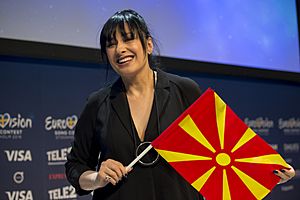Kaliopi facts for kids
Quick facts for kids
Kaliopi
|
|
|---|---|
 |
|
| Background information | |
| Native name |
Калиопи
|
| Birth name | Kaliopi Bukleska |
| Born | 28 December 1966 Ohrid, SR Macedonia, SFR Yugoslavia |
| Genres | |
| Occupation(s) |
|
| Instruments |
|
| Years active | 1976–present |
| Labels | Kaliopi Music Production Hayat Production Hit Records City Records |
| Associated acts | "Kaliopi" (Band) |
Kaliopi Bukle, known simply as Kaliopi, is a famous singer and songwriter from North Macedonia. She was born on December 28, 1966. Kaliopi started her music journey in the 1980s with her own band. She became a well-known singer and composer in North Macedonia and other countries that were once part of Yugoslavia.
Kaliopi represented Macedonia twice in the Eurovision Song Contest. First, she sang "Crno i belo" in 2012 in Baku, Azerbaijan. She returned to Eurovision in 2016 in Stockholm, Sweden, with her song "Dona".
About Kaliopi
Early Life and Start in Music
Kaliopi was born in Ohrid and grew up in Kičevo. Her family had both Aromanian and Macedonian roots. She loved music from a very young age. In 1976, when she was just 10 years old, she won a children's festival called "Zlatno Slavejče" with her song "Mojata učitelka".
After that, she toured with a choir called "Razvigorče". They performed in different countries like Czechoslovakia, Slovenia, and Austria between 1978 and 1980. Kaliopi then studied singing for four years. In 1984, she continued her music training at the Music Academy. She also competed in a singing contest that year and finished in third place. She was the youngest classical music singer there.
Forming the Band "Kaliopi"
In 1984, Kaliopi started a band with Romeo Grill. They recorded their first two songs, "Tomi" and "Nemoj da me budis". The band won an award for their song "Leo" at the Festival Opatija. Journalists from Yugoslavia voted for them.
In 1986, the band released their first album, also called "Kaliopi". That same year, they performed at the Split Festival. They won an award for best new performer with their song "Da more zna".
In 1987, their second album, "Rodjeni", came out. It was very popular and included the hit song "Rodjeni (Bato)". The band was very busy, performing at festivals and on TV. They even had a concert tour in the Soviet Union. At the peak of their fame, Kaliopi and Romeo Grill moved to Switzerland. The band later broke up after a long break.
Solo Career and New Albums
Kaliopi returned to music as a solo artist in Macedonia. In 1996, she competed in Skopje Fest, which chooses the country's song for Eurovision. She won with "Samo ti", meaning she would be the first person to represent Macedonia at Eurovision. However, Macedonia was not chosen to compete that year in a special pre-selection round. Kaliopi tried again in 1998 but placed ninth.
Kaliopi started to rebuild her music career. She wrote songs for other artists. In December 1999, she released her first solo album, "Oboi me". She promoted the album with TV shows and a tour in 2000. This album was her last work with Romeo Grill until 2012. In 2000, Kaliopi started her own record label, Kaliopi Music Production.
In January 2001, Kaliopi announced a new album and a new partnership with producer Darko Dimitrov. The first song from the album was "Ako denot mi e nokj". Other popular songs from the album included "Na pat do Makedonija" and "Dali me sakas". She promoted the album with a TV show and a concert tour across Macedonia.
In February 2002, Kaliopi helped with the song "Pesna za nas" for Skopje Fest. She was a composer and sang backup. In July 2002, she released the song "Najmila". This song was on her live album, "Najmila: Kaliopi Live and Unreleased", which came out in October.
New Music and 30-Year Celebration
In 2003, Kaliopi released the song "Ne mi go zemaj vremeto". This was the title track from her third album, released in December 2003. The album featured duets with other singers, like "Bel den" with Esma Redžepova. It also had popular radio songs like "Za kogo postojam" and "Dari dari dam". This album was her first to include songs in the Serbo-Croatian language.
In 2004, Kaliopi played the main role in the first Macedonian musical, called "Cija si". In November 2004, she was considered for the Eurovision Song Contest 2005. She decided not to compete as a singer but still wrote a song for another finalist, which placed third.
In early 2006, Kaliopi released "1000 Bozji Cvetovi". On March 4, 2006, she competed in the Macedonian national selection for the Eurovision Song Contest 2006 with the song "Silna". She placed sixth. Later, this song was used in a car advertisement. In July 2006, Kaliopi performed at a festival in Montenegro and placed third. She also sang on Croatian singer Massimo Savić's album. In late 2006, Kaliopi celebrated 30 years as an artist with a big concert in Skopje. She sang her greatest hits and was joined by other musicians.
International Career and Collaborations
Kaliopi became more known in Croatia and signed a record deal there. In 2007, she released her first single in Croatia, "Probudi me". This was followed by a "Best of" album. In May 2007, she released "Grev", a song she wrote for a film. In November 2007, Kaliopi was a judge and guest performer at an Albanian music event. She sang "Ako denot mi e nokj" and dedicated it to the late Toše Proeski.
In 2008, Kaliopi released the Serbo-Croatian album "Želim ti reći". She promoted it with songs like "Ljubi". She also performed at festivals in Montenegro and Croatia. In October 2008, Kaliopi took part in a concert honoring Toše Proeski.
In 2009, Kaliopi performed at several festivals. She won an award for her song "Meni je ime" at one festival. She also won the Suncane Skale 2009 festival with Naum Petreski for their song "Rum dum dum".
New Projects and Eurovision 2012
In November 2009, Kaliopi released "Oblivion", an album she made with Edin Karamazov. It featured 11 famous songs in nine languages, played with a lute and guitar. They promoted the album with concerts in 2010. Kaliopi had also sung on Edin Karamazov's earlier album.
In late 2009 and 2010, Kaliopi worked on several music projects. She recorded "Nevinost" for a compilation album. She also recorded "Zasekogaš" and "Zauvijek" for a posthumous release of songs by Toše Proeski. In December 2010, Kaliopi released the album "Poraka". She worked with several producers on this album. It included duets with Marko Vozelj and Edin Karamazov. The Serbo-Croatian version of the album was called "Poruka".
On November 19, 2011, MRT asked Kaliopi to represent Macedonia in the Eurovision Song Contest 2012 in Baku, Azerbaijan. Kaliopi performed the song "Crno i belo", which she wrote the lyrics for, and Romeo Grill wrote the music. After a four-year break, Kaliopi helped Macedonia reach the Eurovision finals again. The song qualified from the semi-final on May 24, 2012. It placed thirteenth in the final on May 26, 2012, scoring 71 points. Before Eurovision, Kaliopi promoted her song in many countries.
The release of "Crno i belo" also marked Kaliopi's return to working with Romeo Grill after twelve years. Their collaboration continued after Eurovision and led to the album "Melem". Kaliopi released songs like "Vučica" and "Mrvica" to promote the album, which came out in February 2013.
Album "Melem" and Other Releases
In 2013, Kaliopi's fans from around the world took part in a karaoke competition called "Kaliopi Fan Festival". Fans voted online for the best video covers of songs from the "Melem" album.
In the spring of 2015, Kaliopi released two new songs: "Mojot Dom" and "Poželi". In the fall of 2015, she released the acoustic song "Jutro".
Eurovision Song Contest 2016
On November 24, 2015, MRT announced that Kaliopi would represent Macedonia again at the Eurovision Song Contest 2016 in Stockholm. Her song was "Dona", released on March 7, 2016. Kaliopi performed the song on May 12, 2016, during the second semi-final of Eurovision. She placed 11th in her semi-final and did not qualify for the final on May 14.
Discography
- Studio albums
with Group Kaliopi
- 1986: "Kaliopi"
- 1987: "Rodjeni"
Solo
- 2000: "Oboi Me"
- 2001: "Ako Denot Mi E Nokj"
- 2004: "Ne Mi Go Zemaj Vremeto"
- 2008: "Zelim Ti Reci"
- 2010: "Poraka" and "Poruka"
- 2013: "Melem"
- 2024: "Album"
with Edin Karamazov
- 2009: "Oblivion"
- Live albums
- 2002: "Najmila – Live and Unreleased"
- 2006: "Kaliopi Live" (DVD Album)
- Instrumental albums
- 2005: "Me, Isadora"
- Compilation albums
- 2007: "The Best Of"
Awards and Achievements
- Festival Opatija accredited journalists award for best interpretation 1985
- "Ekran "award, Best pop singer in Yugoslavia and Macedonia, 1986
- Award of Yugoslavia, 1987
- Radio Skopje award for most popular person in 2001
- "Vecer" award, most famous TV face, 1985, 1986
- "Mlad Borec" award, 1986
- "Nova Makedonija" award, Best Artist, 1986
- Golden Ladybug of Popularity – Singer of the year, 1999, 2001, 2002, 2004, 2010, 2012
- Golden Ladybug of Popularity – Hit of the year, "Dali me sakas", 2001
- Golden Ladybug of Popularity – Hit of the year, "Crno i belo", 2012
- Golden Ladybug of Popularity – Album of the year, "Ako denot mi e nokj", 2001
- Golden Ladybug of Popularity – Album of the year, "Poraka", 2010
- Golden Ladybug of Popularity – Lyricist of the year, "Na pat do Makedonija", 2001
- 12 Veličestveni – Best Album and Best Singer, 1999, 2000
- 12 Veličestveni – Best Album, Best Singer and Best Composer, 2001
- Indexi Award – Female Vocalist of the year, 2009
- BH Music Oscar of Popularity – Best Female Artist, 2010
- Suncane Skale Prince Award – Best Festival Performance, 2009
- Kënga Magjike – Winning composer for the song "Njëri Nga Ata" performed by Jonida Maliqi, 2008
- Awarded with the statue of Mother Teresa, 2004
- President of the Macedonian Association of Music Works Authors – Shpato, 2004
- Honorary Art Ambassador of the Macedonian Economy in the World, 2005
- President of the ZAMP Assembly – Republic of Macedonia, 2005
- Member of MRTV council, 2006
- Honorary Ambassador of UNHCR for the Republic of Macedonia
- "Carina Teodora" award, Serbia, 2008
- Grand-Prix for Music Career, "13 for the Most Successful" in Struga, 2006
- "Davorin Popović Award" for Best Performance at Pjesma Mediterana, 2009
- "Count Cikulin" Award for the Concert at Castle Luznica in Zapresic, June 2010
- Awarded as most successful female manager for 2009 at the traditional "Contest of 10 most successful female managers from Republic of Macedonia", 2009
- MPX award for special merits in the development of music in the region, at the 5th Bosnian Radio Television Festival, December 2010
- Award for special merits in the development and affirmation of Macedonian music in the country and outside its borders, at the 3rd Macedonian Radio Festival, December 2010
See also
 In Spanish: Kaliopi para niños
In Spanish: Kaliopi para niños
- Music of North Macedonia
- SFR Yugoslav Pop and Rock scene
- Macedonia in the Eurovision Song Contest 2012
- Macedonia in the Eurovision Song Contest 2016
 | May Edward Chinn |
 | Rebecca Cole |
 | Alexa Canady |
 | Dorothy Lavinia Brown |


